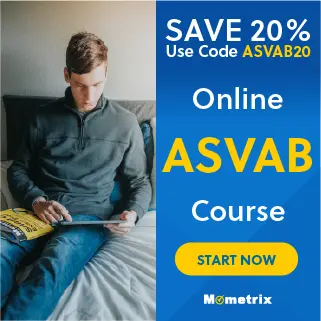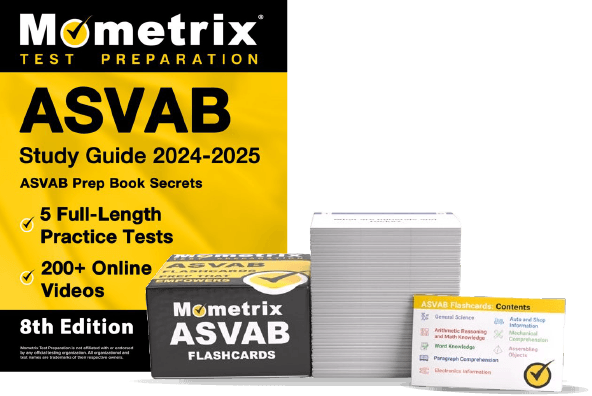Welcome to this overview of the ASVAB!
If you need help studying for the ASVAB or just want some more information about what the test is like, you’ve come to the right place.
Click below to take a free ASVAB practice test!
What’s on the ASVAB?
First, let’s talk about the difference between the CAT-ASVAB and the P&P-ASVAB.
The P&P-ASVAB is the paper-and-pencil version of the test.
The number of questions and the time limit for the ASVAB will differ depending on which version you take. The CAT-ASVAB contains 135 questions with a 186-minute time limit, and the P&P-ASVAB contains 225 questions with a 149-minute time limit.
The AI and SI sections are administered as separate sections on the CAT-ASVAB, while the P&P-ASVAB combines them into one section (AS).
Let’s take a closer look at the contents of the ASVAB as a whole.
GENERAL SCIENCE
(GS)
The General Science questions focus on your general knowledge across several scientific disciplines. These are the topics covered in this section:
- Life Science
- Earth and Space Science
- Physical Science
- Scientific Principles
ARITHMETIC REASONING
(AR)
The Arithmetic Reasoning questions focus on your ability to use basic math to solve word problems. These are the topics covered in this section:
- Basic Arithmetic
- Percentages
- Fractions
- Decimals
- Ratios and Proportions
WORD KNOWLEDGE
(WK)
The Word Knowledge questions focus on your knowledge of word meanings and ability to understand relationships between certain words. These are the topics covered in this section:
- Word Definitions
- Synonyms
- Antonyms
- Word Usage
PARAGRAPH COMPREHENSION
(PC)
The Paragraph Comprehension questions focus on reading comprehension and your ability to obtain information from written material. These are the topics covered in this section:
- Main Idea
- Supporting Details
- Inferences
- Vocabulary
- Author’s Purpose
- Tone
- Summarization
MATH KNOWLEDGE
(MK)
The Math Knowledge questions steer away from word problems and focus more on your direct knowledge of more advanced math. These are the topics covered in this section:
- Algebra
- Geometry
- Functions
- Patterns
- Statistics
- Probability
- Properties of Numbers
ELECTRONICS INFORMATION
(EI)
The Electronics Information questions focus on your knowledge of electrical principles, basic electronics, and electrical devices. These are the topics covered in this section:
- Electrical Circuits
- Electrical Principles and Terms
- Electronic Devices
- Measurement and Tools
- Power Distribution
- Safety
AUTO INFORMATION (CAT-ASVAB ONLY)
(AI)
The Auto Information questions focus on your knowledge of automotive maintenance, systems, and repair. These are the topics covered in this section:
- Automotive Systems
- Engine Types and Operations
- Electrical Systems
- Transmission Systems
- Braking Systems
- Vehicle Maintenance and Repair
- Automotive Tools
SHOP INFORMATION (CAT-ASVAB ONLY)
(SI)
The Shop Information questions focus on your knowledge of tools, materials, and basic shop practices. These are the topics covered in this section:
- Identification of Tools
- Materials
- Fasteners
- Measurements
- Basic Shop Safety
- Shop Practices and Techniques
- Blueprint Reading
- Schematic Interpretation
AUTO AND SHOP INFORMATION (P&P-ASVAB ONLY)
(AS)
The Auto and Shop Information questions focus on your knowledge of automotive maintenance, systems, and repair, as well as tools, materials, and basic shop practices. These are the topics covered in this section:
- Automotive Systems
- Engine Types and Operations
- Electrical Systems
- Transmission Systems
- Braking Systems
- Vehicle Maintenance and Repair
- Automotive Tools
- Identification of Tools
- Materials
- Fasteners
- Measurements
- Basic Shop Safety
- Shop Practices and Techniques
- Blueprint Reading
- Schematic Interpretation
MECHANICAL COMPREHENSION
(MC)
The Mechanical Comprehension questions focus on your understanding of mechanical and physical principles, and how different mechanical processes work. These are the topics covered in this section:
- Levers
- Pulleys
- Gears
- Inclined Planes and Wedges
- Wheel and Axle Systems
- Hydraulics and Pneumatics
- Simple Electrical Circuits
- Properties of Materials
- Newton’s Laws of Motion
- Work, Power, and Energy
- Fluid Dynamics
ASSEMBLING OBJECTS
(AO)
The Assembling Objects questions focus on your spatial visualization ability and your skills in understanding how different parts fit together to form a whole. These are the topics covered in this section:
- Spatial Orientation
- Pattern Recognition
- Puzzle-Solving
- Following Assembly Instructions
- Manipulating Objects
ASVAB vs. AFQT
People often think that the AFQT is either another name for the ASVAB or maybe an entirely separate exam that they have to take.
In reality, the ASVAB is the only exam you’ll have to take. The Armed Forces Qualification Test (AFQT) is actually a scoring system that’s used to see if you’re even eligible to enlist in the military at all.
Here’s how it works.
Before your overall ASVAB score is looked at, the scores from the Arithmetic Reasoning (AR), Math Knowledge (MK), Paragraph Comprehension (PC), and Word Knowledge (WK) sections are combined to create your AFQT score.
These sections test the basic essentials that are deemed necessary to enlist in the military. If your AFQT score is high enough, then your full performance on the ASVAB is looked at to determine which branch of the military you would be best suited for.
How the ASVAB is Scored
First, let’s look at how the AFQT score is determined.
AFQT Score
Your AFQT score is set as a percentile between 1 and 99. This means that if your AFQT score is 85, you scored as well as 85% of test-takers!
So what counts as a passing AFQT score? That depends on which branch of service you plan on joining.
If you are not satisfied with your score and want to retake the test, you’ll have to wait a month before taking it again.
You can retake the test as many times as you want, but after 3 attempts the waiting period jumps to 6 months.
ASVAB Score
Once your AFQT score is determined and is considered a passing score, your remaining ASVAB scores will be determined. Your score in each area reflects your own unique abilities, so they will affect the assignments you get after you’re enlisted.
ASVAB Online Prep Course
If you want to be fully prepared, Mometrix offers an online ASVAB prep course. The course is designed to provide you with any and every resource you might want while studying. The ASVAB course includes:
- Review Lessons Covering Every Topic
- 1,550+ ASVAB Practice Questions
- Over 270 Video Tutorials
- More than 300 Electronic Flashcards
- Money-back Guarantee
- Free Mobile Access
- and More!
The ASVAB Prep Course is designed to help any learner get everything they need to prepare for their ASVAB exam. Click below to check it out!
FAQs
What is the ASVAB?
The ASVAB is a multiple-choice test taken by over 1 million military applicants, high-school students, and post-high-school students in order to evaluate their suitability for enlistment in the US Army.
How many questions are on the ASVAB?
The computerized version of the test (CAT-ASVAB) contains 135 questions in total, and the paper-and-pencil version of the test (P&P-ASVAB) contains 225 questions in total.
Is the ASVAB hard?
Overall, the ASVAB is not considered to be a difficult exam to pass, especially if you take the initiative to study well beforehand.
Can you use a calculator on the ASVAB?
No, you will not be permitted to use a calculator during the exam.
Self-Assessment Modules
One of the most important parts of preparing for a test is determining which topics you need to brush up on as you study.
To get started with a self-assessment of your knowledge, click on one of the modules below!



 ASVAB Online Course
ASVAB Online Course ASVAB Study Guide
ASVAB Study Guide ASVAB Flashcards
ASVAB Flashcards




